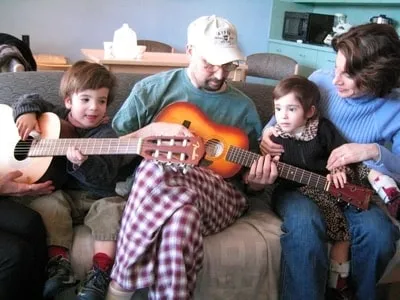Caregiver's Perspective: Shifting Moments

Editor's Note: This is part of Nancy's Caregiving series. Please see other posts in this series.
With home hospice in place, most days we hunkered down in our apartment. Norma, our hospice aide, followed Brett around, ready to catch him when he fell since he resisted using a cane and walker. Sometimes Brett was surprisingly lucid, snapping at me when I tried to help him dress or get coffee. “I can do it,” he’d say. I meant well but struggled to let him do the simple things that I could do for him. Buttoning an Oxford shirt was something I could tackle, curing his cancer was not.
Being Brett’s wife and caregiver was a complicated role, and it strained my nerves. It was hard to simply rest my head on his shoulder the way I used to, or to express my own need for emotional intimacy and comfort when the gravity of his illness loomed large. I bounced back quickly from hurt feelings because there was no choice but to be present when we our time together as a family was diminishing. Every moment mattered.
Though we never made a bucket list, there was an unspoken urgency about how to make the most of our last months together. One day, our dear friends Nancy and Stuart planned an outing to Philadelphia so that Brett could eat an authentic cheesesteak sandwich one last time. Stuart made a cassette of Brett’s favorite music—all Bruce Springsteen and Dave Matthews Band—which calmed him in only the way music can when words fail to capture the meaning of the moment. We bolstered our spirits singing along with Bruce to “You ain’t a beauty but hey you’re all right.”
Was it absurd to trek a dying man two hours in a car to taste a real Philly cheesesteak? Maybe. But there was something essential about it, too. We gave him a taste of life again, and he gave us a precious memory to hold. Little did I know that that would be among the last times we took a car trip. Special as it was, the outing exhausted Brett.
The Penultimate Moment
Our friends Sarah and Wim came for dinner one uneventful day in January. They, too, wanted to savor time with Brett and to support me. We were fortunate to have friends to normalize scarce moments of couplehood during this time.
I ordered Brett’s favorites: chicken saté with peanut sauce, a pineapple shrimp dish, and sticky rice. Brett insisted on serving himself even though he was wobbly on his feet and his hands shook. I kept one watchful eye on him and the other on our friends, making a toast, “to good friends.” I don’t recall even taking a sip before I saw Brett tumble backwards and collapse onto the kitchen floor. I was frozen in place screaming his name, watching Wim rush towards Brett and prop his body against his. He was out cold. Sarah pulled me back to reality and we called the ambulance.
At the hospital, Brett regained consciousness but was agitated from all the excitement.
I paged his neuro-oncologist. By the time she arrived, Brett was settled in a room. Dr. Gardner had a gentle, calming presence and reassured him that he was in good hands.
“Can I talk to you outside?” she asked me. “You understand he can’t come home now,” Dr. Gardner said.
I didn’t say anything because I couldn’t find the words. I wasn’t ready or even able to make such an enormous decision but here it was. Dr. Gardner was making it for me.
“He’s going to get a lot sicker and you won’t be able to manage his care alone, even with hospice,” she continued. “A seizure like this would traumatize the twins. He needs a different level of care now.”
I leaned against the hospital wall, taking in her words. This was the pinnacle moment in Brett’s cancer journey, the moment I had long feared in all the years of living with premature anticipatory grief. My head started to spin with the reality of the situation and what it would mean to our family. But I knew Dr. Gardner was right. I had to protect our children, which Brett would have wanted.
Suggested Resources:
Caregivers
www.CancerSupportCommunity.org/caregivers
10 Tips for Caregivers
www.CancerSupportCommunity.org/living-cancer/living-cancer-topics/caregivers/ten-tips-caregivers
Friends & Family
www.CancerSupportCommunity.org/family-and-friends
Talking to Kids and Teens about Cancer
www.CancerSupportCommunity.org/talking-kids-teens-about-cancer
Coping with Brain Tumors
www.CancerSupportCommunity.org/coping-brain-tumor
Hospice
hospicefoundation.org/Hospice-Care
Fear of Death and Dying
www.CancerSupportCommunity.org/managing-fear#tab2
Bereavement
www.CancerSupportCommunity.org/bereavement
Find Support
www.CancerSupportCommunity.org/cancer-support-helpline
MyLifeLine
www.MyLifeLine.org
Find a local CSC or Gilda's Club for support groups and other resources
www.CancerSupportCommunity.org/FindLocation